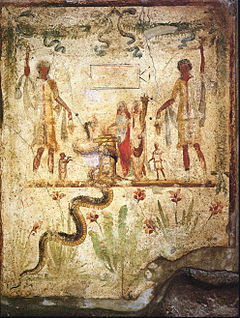
Back Каристия Bulgarian Carístia Catalan Caristia (fiesta) Spanish کاریستیا FA Caristia French Caristia Hungarian Caristia Italian Caristia LA Caristia Dutch Caristia Polish
| Caristia | |
|---|---|
 | |
| Observed by | Roman Republic, Roman Empire |
| Type | Classical Roman religion |
| Celebrations | family dinners, gifts (sportulae), distributions of bread and wine |
| Observances | offerings to the Lares |
| Date | February 22 |
| Related to | Parentalia and ancestor cultus |
In ancient Rome, the Caristia,[1] also known as the Cara Cognatio, was an official but privately observed holiday on February 22 that celebrated love of family with banqueting and gifts. Families gathered to dine together and offer food and incense to the Lares as their household gods.[2] It was a day of reconciliation when disagreements were to be set aside, but the poet Ovid observes satirically that this could be achieved only by excluding family members who caused trouble.[3]
- ^ The 1988 Teubner edition of the Ovid's Fasti (2.616) gives Karistia.
- ^ Michele Renee Salzman, "Religious Koine and Religious Dissent in the Fourth Century," A Companion to Roman Religion (Blackwell, 2007), p. 115; Ittai Gradel, Emperor Worship and Roman Religion (Oxford University Press, 2002), p. 208.
- ^ Ovid, Fasti 2.623–626, 631–632; William Warde Fowler, The Roman Festivals of the Period of the Republic (London, 1908), p. 418.